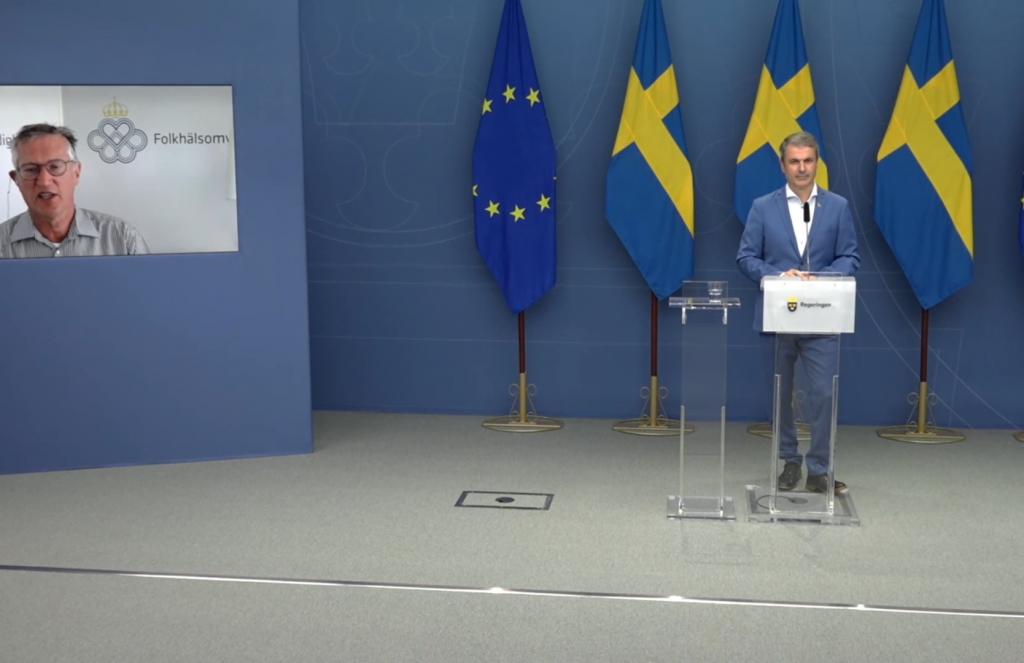Thessaloniki gets ready for its metro launch in November
The underground rapid transit lines have been under construction for almost two decades due to various project delays
 TheMayor.EU logo
TheMayor.EU logo 
Screenshot from the 12 July press conference announcing the loosening of the restrictions, Source: Government of Sweden
This was deemed possible after COVID situation was said to be “moving in the right direction”
Developments in the pandemic are steadily moving in the right direction. This is the formal conclusion of the Swedish authorities who held a press conference on Monday to announce further loosening of in-place measures. The new rules start applying today, 15 July.
The spread of infection and the number of people who need hospital care for COVID-19 is decreasing every week. Almost 70 percent of the adult Swedish population has received at least one dose of vaccine. The above means that the authorities felt confident in their assessment to proceed with step 3 in the Government's plan for the abolition of the restrictions.
“It is positive that we can ease the restrictions even more, but feel free to spend time outdoors as much as possible this summer and think about continuing to keep your distance from others and avoiding congestion,” recommended Anders Tegnell, state epidemiologist at the Swedish Public Health Agency, when speaking at the press conference on Monday.
Indeed, people can now relax and enjoy summer better given the loosening in measures.
The square meter limit that governs how many people are allowed to stay in a certain place at the same time, for example, a shop, a gym, an amusement park or a zoo, will be removed. Businesses must still take measures to avoid congestion and companies must be able to keep their distance from each other. The responsibility for ensuring that this is followed lies with both the business and the individual.
The size of parties that have designated seats at a public gathering or a public event, such as football games, is increased from four to eight people. This applies to both indoor and outdoor venues. The parties must still be able to keep a distance of at least 1 meter from other groups.
The government has also decided that passenger restrictions in long-distance public transport will be removed and that the municipalities' ability to decide on a stay ban in specified places will be abolished.
If goes according to plan, the next Step, number 4, is set to take place in September.
If you want to keep up with how European cities and regions are changing, follow us on Facebook, Twitter and Instagram.

The underground rapid transit lines have been under construction for almost two decades due to various project delays

Now you can get your wine in Talence by paying directly in Bitcoin

That’s because the state has to spend money on updating the railway infrastructure rather than subsidizing the cost of the popular pass

Rethinking renewable energy sources for the urban landscape

The examples, compiled by Beyond Fossil Fuels, can inform and inspire communities and entrepreneurs that still feel trepidation at the prospect of energy transition

Now you can get your wine in Talence by paying directly in Bitcoin

The 10th European Conference on Sustainable Cities and Towns (ESCT) sets the stage for stronger cooperation between the EU, national and local level to fast track Europe's transition to climate neutrality.

At least, that’s the promise made by the mayor of Paris, Anne Hidalgo

The underground rapid transit lines have been under construction for almost two decades due to various project delays

At least, that’s the promise made by the mayor of Paris, Anne Hidalgo

Hostal de Pinós is located in the geographical centre of the autonomous region

Despite its church-y name, the district has long been known as the hangout spot for the artsy crowds

Urban dwellers across the EU are having a say in making their surroundings friendlier to people and the environment.

Forests in the EU can help green the European construction industry and bolster a continent-wide push for architectural improvements.

Apply by 10 November and do your part for the transformation of European public spaces

An interview with the Mayor of a Polish city that seeks to reinvent itself

An interview with the newly elected ICLEI President and Mayor of Malmö

A conversation with the Mayor of Lisbon about the spirit and dimensions of innovation present in the Portuguese capital














